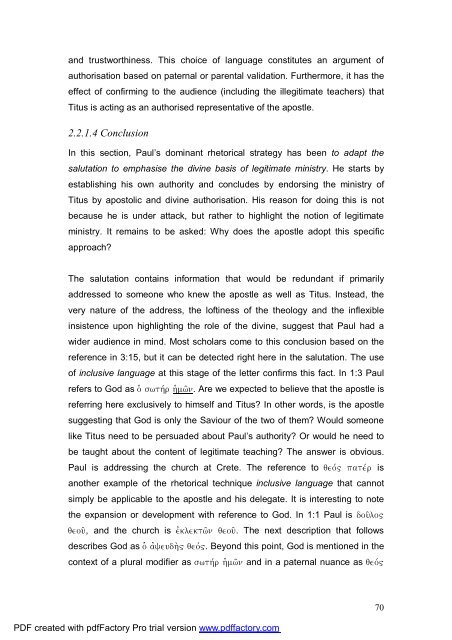A Text centred rhetorical analysis of Paul's Letter to Titus
A Text centred rhetorical analysis of Paul's Letter to Titus
A Text centred rhetorical analysis of Paul's Letter to Titus
Create successful ePaper yourself
Turn your PDF publications into a flip-book with our unique Google optimized e-Paper software.
and trustworthiness. This choice <strong>of</strong> language constitutes an argument <strong>of</strong><br />
authorisation based on paternal or parental validation. Furthermore, it has the<br />
effect <strong>of</strong> confirming <strong>to</strong> the audience (including the illegitimate teachers) that<br />
<strong>Titus</strong> is acting as an authorised representative <strong>of</strong> the apostle.<br />
2.2.1.4 Conclusion<br />
In this section, Paul’s dominant <strong>rhe<strong>to</strong>rical</strong> strategy has been <strong>to</strong> adapt the<br />
salutation <strong>to</strong> emphasise the divine basis <strong>of</strong> legitimate ministry. He starts by<br />
establishing his own authority and concludes by endorsing the ministry <strong>of</strong><br />
<strong>Titus</strong> by apos<strong>to</strong>lic and divine authorisation. His reason for doing this is not<br />
because he is under attack, but rather <strong>to</strong> highlight the notion <strong>of</strong> legitimate<br />
ministry. It remains <strong>to</strong> be asked: Why does the apostle adopt this specific<br />
approach?<br />
The salutation contains information that would be redundant if primarily<br />
addressed <strong>to</strong> someone who knew the apostle as well as <strong>Titus</strong>. Instead, the<br />
very nature <strong>of</strong> the address, the l<strong>of</strong>tiness <strong>of</strong> the theology and the inflexible<br />
insistence upon highlighting the role <strong>of</strong> the divine, suggest that Paul had a<br />
wider audience in mind. Most scholars come <strong>to</strong> this conclusion based on the<br />
reference in 3:15, but it can be detected right here in the salutation. The use<br />
<strong>of</strong> inclusive language at this stage <strong>of</strong> the letter confirms this fact. In 1:3 Paul<br />
refers <strong>to</strong> God as oJ swthvr hJmw`n. Are we expected <strong>to</strong> believe that the apostle is<br />
referring here exclusively <strong>to</strong> himself and <strong>Titus</strong>? In other words, is the apostle<br />
suggesting that God is only the Saviour <strong>of</strong> the two <strong>of</strong> them? Would someone<br />
like <strong>Titus</strong> need <strong>to</strong> be persuaded about Paul’s authority? Or would he need <strong>to</strong><br />
be taught about the content <strong>of</strong> legitimate teaching? The answer is obvious.<br />
Paul is addressing the church at Crete. The reference <strong>to</strong> qeov~ patevr is<br />
another example <strong>of</strong> the <strong>rhe<strong>to</strong>rical</strong> technique inclusive language that cannot<br />
simply be applicable <strong>to</strong> the apostle and his delegate. It is interesting <strong>to</strong> note<br />
the expansion or development with reference <strong>to</strong> God. In 1:1 Paul is dou`lo"<br />
qeou', and the church is ejklektw`n qeou'. The next description that follows<br />
describes God as oJ ajyeudh;" qeov". Beyond this point, God is mentioned in the<br />
context <strong>of</strong> a plural modifier as swthvr hJmw`n and in a paternal nuance as qeov~<br />
PDF created with pdfFac<strong>to</strong>ry Pro trial version www.pdffac<strong>to</strong>ry.com<br />
70

















